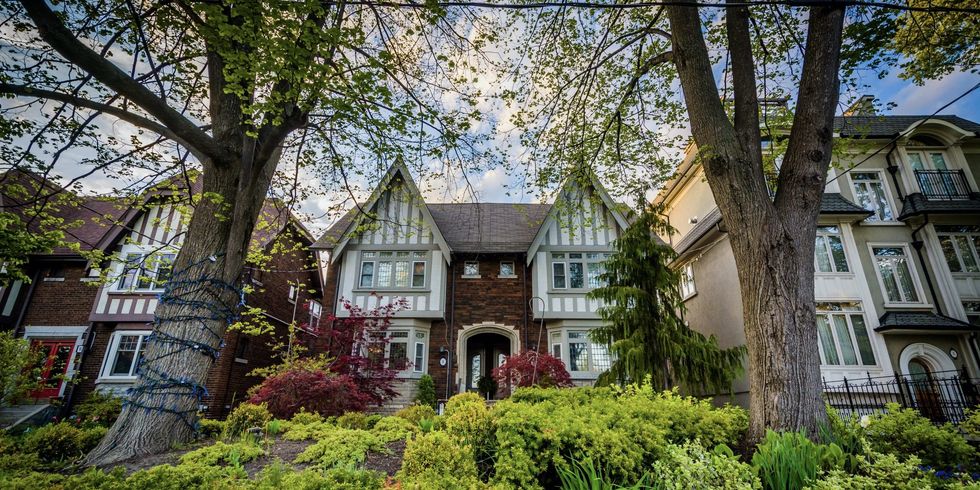For empty nesters and the retired set, the term ‘downsizing’ doesn't exactly have a history of evoking excitement.
For many, the thought is that downsizing occurs later in life when it becomes too challenging to maintain the family home.
“The typical picture people have in their minds is adult children or grandchildren having to make decisions about what to do with Grandma’s fine china collectables, or Grandpa’s buckets of broken tools after a health crisis forces them into an assisted living home,” says Toronto-based downsizing expert and realtor, Keisha Telfer, co-founder of Transitions Realty.
Another outdated notion is that downsizing means a downgrade in personal living space – a belief that likely stems from the fact that condos 30+ years ago simply weren’t on the level they are today.
But times have changed, especially in cities like Toronto.
Rather than sacrifices, downsizing early can actually be associated with upgrading – something that’s reflected in everything from luxe home finishes and five-star amenities, to more cash in the bank to take full advantage those well-deserved golden years (once the world returns to normal, that is).
“If done properly, downsizing for Boomers is a proactive, planned transition, leveraging the equity in their home to fund their new lifestyle and find a renewed purpose. We call this ‘rightsizing’ or ‘upsizing’ your life,” says Telfer. “The Baby Boom generation is more active, more mobile, more connected, and wealthier than any previous generations. Downsizing early means creating your third age, living the way you want to live.”

If you’re living in a detached single-family home in Toronto, but realistically only use just a half or a quarter of the space your house affords, now may be an ideal time to consider selling, say experts. While the ongoing pandemic continues to wreak havoc on most parts of the economy, Toronto’s housing market is booming – something that’s reflected in record-high figures.
According to the December 2020 market report from the Toronto Regional Real Estate Board (TRREB), detached homes accounted for 42.3% of sales in December, with prices rising 17.7% year over year.
“Housing types like detached single-family homes have surged to popularity in light of the pandemic, with young hopeful buyers looking for more outdoor and indoor spaces to accommodate working and living from home,” says Telfer. Many Boomers currently occupy these coveted houses. Telfer says this pent-up demand for detached homes has bolstered the average price for single-family home types in the suburban regions of the Greater Toronto Area (GTA). Of course, anyone in the market is well aware of this reality.
“So, the question isn’t ‘should boomers downsize early?’ but ‘why shouldn’t they downsize early?’ when their chance to capitalize on this extra bump in home value is here right now,” says Telfer.
For many, downsizing means moving into an amenity-packed condo where things like shovelling snow, cutting grass, and walking to get mail are removed from the equation.
“Downsizing is an increase in lifestyle,” echoes Christopher Castellano, head of marketing and sales at Camrost Felcorp Inc. “You’re no longer required to do all this maintenance and upkeep on your house, and now have a suite of amenities, a concierge, and hotel-like conveniences.”
Castellano points to the fact that many downsizers haven’t upgraded their homes in at least a decade. “Now, they can sell their home for top-of-the-line appliances, designer finishes, professional gym equipment, and impressive architecture,” he says.
He points to Leaside’s upcoming Upper East Village master-planned community, for example, as a property that has attracted a large number of downsizers from across the GTA. “We’re seeing downsizers from very urban environments transitioning to a quieter place that’s still highly accessible to the downtown core,” says Castellano. “Another segment are downsizers from traditional suburbs who want to be close to their kids.”

The biggest factor to consider says Castellano, is that downsizers should realistically look at what the most essential space they use is and where they spend the most time. “Then, at the end of the day, look at how their lifestyle will improve by making a move to a condominium – things like maintenance, amenities, a concierge, and location,” he says.
Indeed, condo living makes sense for many. But, with the current state of the market – incredibly high supply with an incredibly low demand – some Baby Boomers contemplating downsizing may rightfully question whether now is the best time to purchase a condo.
“This may be painting with a broad brush, but typically downsizers in the GTA go after product that sits around $1.2 to $1.6 million,” says Castellano. “So, at that level, condos have been stable throughout the pandemic and we’re now seeing that those condos are starting to get a lot more attention. I think it’s due to the incredible run-up of detached homes and semi-detached homes in the resale market.”
For those who take the downsizing plunge, Telfer advises to prepare for both a complex modern-day real estate market and the emotional hurdles associated with physical memories and attachments.
“When downsizing, it’s important to keep in mind that you probably haven’t moved for many years, and a lot has changed in the real estate and financial world since the last time you moved; there are a lot more aspects than just the sale of your home to think about,” says Telfer. “If you get ahead of the game and figure out your plan to downsize early, you can address any areas of concern.”
For many downsizers, the emotional toll associated with parting with a longtime family home and the countless memories made within its walls are tougher than the sales logistics. “One important conversation to have with anyone making this transition is how to incorporate momentos, photos, collections, and other important tokens into their future living space and lifestyle, but also how to preserve the memories they have,” says Telfer.
Of course, downsizing means the creation of new memories, as active retirees and empty nesters enter this so-called “third age” of life.
“For some, downsizing might actually mean a condo in a downtown core, or a bungalow in a suburban quaint town, close to golf and hiking trails,” says Telfer. “Or, it may mean R.V-ing on the road for four months of the year."
Regardless of the vision, the facts speak for themselves: the average detached home sold in Toronto in December 2020 was just shy of $1.5M. And that money goes a lot farther when you're picking the space you need rather than keeping up the one you're no longer using.





















